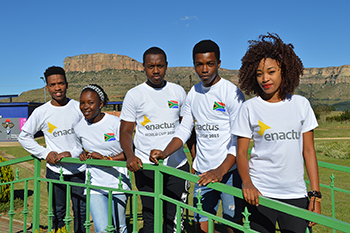Latest News Archive
Please select Category, Year, and then Month to display items
30 October 2018
|
Story Rulanzen Martin
|
Photo Peet van Aardt
 Some of the student writers who contributed to the anthology that tells their stories in Sesotho, isiXhosa, isiZulu, English and Afrikaans.
Some of the student writers who contributed to the anthology that tells their stories in Sesotho, isiXhosa, isiZulu, English and Afrikaans.
How do you transform the higher education curriculum? You involve the exact people the curriculum is intended for. The book, Initiative for Creative African Narratives (iCAN,) illustrates how decolonisation can be achieved through literature for students by students.
iCAN is an initiative by the Centre for Teaching and Learning (CTL) at the University of the Free State (UFS) to mentor students in creative and narrative writing. Under the mentorship of Dr Peet van Aardt, project coordinator, and Ace Moloi, author and UFS alumnus, iCAN Volume 1 was recently launched with 47 short stories written by UFS students.
“The project is a response from the centre for the ever-increasing need for decolonised curricula, steeped in the local cultural perspective of ubuntu,” said Dr Van Aardt.
“This book is an example for how decolonisation can be implemented,” said Prof Francois Stydrom, Senior Director of CTL. The overall aim of the iCAN project is to have the content that materialised from it to be included in the curriculum of first-year students at UFS in the near future.
Book provides multiple voices
Starting in May 2018, CTL presented a series of creative writing workshops on all three of the UFS campuses. “It’s a medium that allows a diverse range of students to express their views and develop their voices as writers,” said Prof Strydom.
It is a form of empowerment, to pass the baton to students to improve the UFS curriculum by writing and publishing their own stories, thereby contributing to larger bodies of knowledge through their lived experiences.
“I believe we as a university need to enable students so that they move away from just being users to becoming contributors to the curriculum,” Dr van Aardt concluded.
Enactus heeds call to be of service to its communities
2017-01-17

The newly-elected vice president of Enactus
University of the Free State, Solomuzi Khati
(third from left) with members of Enactus on
the Qwaqwa Campus.
Photo: Thabo Kessah
The future of South Africa is in good hands if Enactus activities are anything to go by. Enactus is an international non-profit organisation bringing together student, academic and business leaders committed to using entrepreneurial action to improve lives. And the Qwaqwa Campus chapter is doing exactly that – changing lives.
Community engagement
This team of enthusiastic and energetic students have touched the Qwaqwa community in more ways than one through their community engagement activities. One such activity was when they adopted the Team Spirit Centre as their partner for development and empowerment.
“Up to now, the chapter has lived up to its purpose of assisting and uplifting the Qwaqwa community. As part of our programme, we identified a problem that we are currently helping to solve,” said Solomuzi Khati, the newly-elected vice president of Enactus University of the Free State.
Skills development
“We have realised that many centres housing orphaned and vulnerable children, like the Team Spirit in Makoane in Qwaqwa, are not sustainable. Our project introduced a business concept to the centre where we helped to plant vegetables so the owner Mrs Manthabeleng could then use and sell at a later stage,” he said. “In the process, students and Mrs Manthabeleng would develop various entrepreneurial, finance and business skills for future use on top of the centre generating income to sustain itself,” he added.
Appointment of Advisory Board
Khati also revealed Enactus was in the process of inviting business and community leaders into their Business Advisory Board. “This is a group of business people who are recruited to serve as mentors for our team. Typically, a Business Advisory Board is composed of 10-50 business leaders in the community. Board members can keep students informed of current business concerns and trends, provide financial or in-kind assistance for projects, critique annual reports and presentations, and provide networking opportunities.”